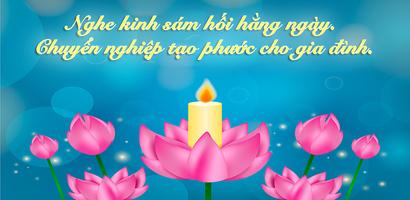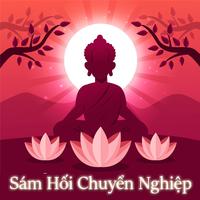Repentance Sutra - Changing karma


Listen to the prayer of repentance, help eliminate sins, transform your karma
The meaning and benefits of repentance
In Buddhism, repentance is not a "baptism" like the conceptions of some other religions, but an act of boldly acknowledging mistakes in order to correct oneself. Buddhism never believes that there is a god who can forgive or accuse, but repentance is a method of self-reflection.
The concept of repentance
The Buddha often praised "In the world there are two types of people worthy of praise: the first class is the person who is blameless, the second class is the person who has repented and repented." He decisively states: “If a person descends and ascends in the three kingdoms, and rolls in the six paths, there is not a single species that is completely pure, and there is not a single person without sin.” All sentient beings in daily life are not free from errors created by accident or design. A Buddhist is someone who dares to admit the mistakes they have made.
In Buddhism, repentance is not a "baptism" or absolution, as the conceptions of other religions make it, but is an act of boldly acknowledging mistakes and then correcting them yourself. Buddhism never believes that there is a god who can forgive or accuse, but repentance is a method of self-reflection in order to sublimate oneself for every Buddhist child on the path of monasticism and Buddhist study. This can be seen as the way to transform the three karmas in the process of improving one's personality from the status of an ordinary person to Buddhahood.
What is repentance?
Definition: It is called Samma in Sanskrit and translates to "remorse" in Chinese. In the sutra it is written: "Confess the false, repent in advance, repent in time, regret the past" (repent first, let go later).
Thus, repentance is self-repentance, shame for the mistakes that have already been made, vowing to change and not daring to make those mistakes again. In other words, repentance is "repenting and forsaking", this is the heart of regretPlay Fortune Ox at Pin-Up Casinomento. But if you commit a crime regularly, then often repent, then sin again and repent, then this has no meaning and is not the method of repentance taught by the Buddha. Repentance can be seen as the boldness to repent and admit the wrongs of the world, when we let someone sad and angry, come forward and apologize. In Buddhism, too, due to the wrong actions of the body, unskillful speech and careless thoughts of evil, now realizing that they have revealed their own mistakes, they sincerely repent and are determined not to repeat them.
Methods of Repentance: They know that mistakes are made by the mind, so they should also repent from the heart. That is why the patriarchs chose various methods of repentance, both in matters and physical. The penitential essay that Buddhists often read when writing a penitential dharma:
I have created many evil deeds in the past,
All because of beginningless greed
Born of body, mouth and mind
Everyone, now I regret it.
In repentance:
The repentance method: By establishing a forum to ask monks to prove, the penitent presents his mistakes sincerely, repenting and not repeating them.
The Prime Minister repents: The penitent should come to the altar of Buddha and Bodhisattva sincerely to worship from 1 day, 7 days to 49 days, only when he sees the good appearance of Buddha and Bodhisattva or lotus flower.
Red name repentance: This is a method of repentance, compiled by Real Estate, a shaman of the Song dynasty, taken from 53 Buddha titles in the Five Thirteen Buddha Sutras and 35 titles in the Quan Duoc Vuong and Duoc Thuong Sutras.
This is the most common penitential ritual used by Vietnamese pagodas during the days of repentance.
Regarding the reason for regret:
Unborn repentance: the reason for repentance is for those with high faculties, so here we only know through this dharma with two forms of contemplation:
Contemplation of the birthless mind: This is the principle taken from the Vajrayana Sutra: "The mind of the past cannot be, the mind of the present cannot be, and the mind of the future cannot be." Use the method of contemplation to see clearly: "The sin of the mind is also born of the dying mind."
Contemplation of non-birth: Observe the true generals of non-birth and death "in the saints, not increasing in the ordinary, not decreasing"; This is only for the true mind, the Buddha's knowledge, the Dharma body... Because when the true mind is received, the generals of birth and death will no longer exist.
Crash